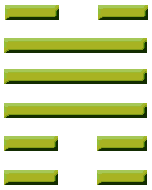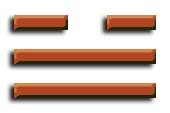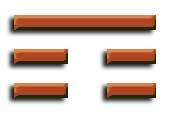
I Ching Hexagram nr. 31
|
Xián or Hsien – Conjoining, influence, feelings |
|
 Øverst |
Trigram: Tui The Joyous, Lake |
 Nederst |
Trigram: Kên Keeping Still, Mountain |
Beskrivelse af billedet:
En sø på bjerget: Billedet af indflydelse. Den overlegne mand tilskynder derfor folk til at nærme ham af hans villighed til at modtage dem. Et bjerg med en sø på sit topmøde stimuleres af fugten fra søen. Det har denne fordel, fordi topmødet ikke rager ud som en top, men er sunket. Billedet rådgiver, at sindet skal holdes ydmyg og fri, så den kan forblive modtagelig for gode råd. Folk snart opgive rådgivning en mand, der tror, at han ved alting bedre end nogen anden.
The Image
A lake on the mountain: The image of influence. Thus the superior man encourages people to approach him By his readiness to receive them. A mountain with a lake on its summit is stimulated by the moisture from the lake. It has this advantage because its summit does not jut out as a peak but is sunken. The image counsels that the mind should be kept humble and free, so that it may remain receptive to good advice. People soon give up counseling a man who thinks that he knows everything better than anyone else.
I Ching helt enkeltHexagram nr. 31Hexagrammet Hsien angiver en indflydelses komme. Det kan være i form af en instruktion fra den Vise, et vekselspil med en anden, eller en foruroligende eller behagelig begivenhed. Under alle omstændigheder vil skæbnen være gunstig, hvis du møder denne påvirkning med rette tanker og handlinger. Det er et godt tidspunkt at huske på, at hvor godtfolk er, kommer godtfolk til. Giver man udtryk for højere ting, omgives man af højere ting. Hengiver man sig til det mindreværdige, kan man forvente selskab af ligesindede. Derfor er det klogt at fastholde ydmyghed, uafhængighed, mildhed og åbenhed. Hold dit hjerte åbent for andre, frit for stærke ønsker, uden at fordømme nogen, nyd beslægtetheden, mens du bibeholder ligevægten. Hold forbindelsen klar til den Vise. Vær rådsnar i tjenesten som kanal for sandhed og uskyld og godhed. Er påvirkningen udfordrende, vær da udholdende i korrekthed. Er den behagelig, vær da også udholdende i korrekthed. At opretholde din hengivenhed over for højere ting sikrer succes i tiden fremover. Generelt Succes er sikret, når tiltrækning styrkes af gensidig respekt og støtte. Kærlighed Hvis din partner har supplerende kvaliteter så er du godt matchet. Forretning Søg en partner eller partnerskab, der supplerer dine egne styrker. Personligt Respektere og ære dem som er omkring dig. |
| Kommentar
From the book I Ching. The name of the hexagram means “universal,” “general,” and in a figurative sense “to influence,” “to stimulate.” The upper trigram is Tui, the Joyous; the lower is Kên, Keeping still. By its persistent, quiet influence, the lower, rigid trigram stimulates the upper, weak trigram, which responds to this stimulation cheerfully and joyously. Kên, the lower trigram, is the youngest son; the upper, Tui, is the youngest daughter. Thus the universal mutual attraction between the sexes is represented. In courtship, the masculine principle must seize the initiative and place itself below the feminine principle. Just as the first part of book 1 begins with the hexagrams of heaven and earth, the foundations of all that exists, the second part begins with the hexagrams of courtship and marriage, the foundations of all social relationships. |
| Navnet på hexagram betyder “universal”, “generelt”, og i overført betydning “for at påvirke,” “for at stimulere.” Det øverste trigram er Tui, den glade; jo lavere er Ken, holde stille. Med sit vedholdende, rolig indflydelse, jo lavere, stive trigram stimulerer øvre, svag trigram, der reagerer på denne stimulation muntert og glædesfyldt.
Ken, det nederste trigram, er den yngste søn; den øverste, Tui, er den yngste datter. Således den universelle gensidige tiltrækning mellem kønnene er repræsenteret. I frieri, skal det maskuline princip gribe initiativet og stiller sig under det feminine princip. Ligesom den første del af bogen 1 begynder med hexagrammer af himmel og jord, grundlaget for alt, der eksisterer, den anden del begynder med hexagrammer af frieri og ægteskab, grundlaget for alle sociale relationer. |
Nederste linje
Six at the beginning means: The influence shows itself in the big toe.
A movement, before it is actually carried out, shows itself first in the toes. The idea of an influence is already present, but is not immediately apparent to others. As long as the intention has no visible effect, it is of no importance to the outside world and leads neither to good nor to evil.
Foden er sat i døren. Det er et godt tidspunkt for dig til at gøre status over din holdning og rette den, om nødvendigt. Kun da kan succesen komme uden hindringer.
Linje 2
Six in the second place means: The influence shows itself in the calves of the legs. Misfortune. Tarrying brings good fortune.
In movement, the calf of the leg follows the foot; by itself it can neither go forward nor stand still. Since the movement is not self-governed, it bodes ill. One should wait quietly until one is impelled to action by a real influence. Then one remains uninjured.
Lad dig ikke forføre af det ydre. Sandt fremskridt tager tid, og meget af den Vises arbejde gøres usynligt for os, så vær tålmodig.
Linje 3
Nine in the third place means: The influence shows itself in the thighs. Holds to that which follows it. To continue is humiliating.
Every mood of the heart influences us to movement. What the heart desires, the thighs run after without a moment’s hesitation; they hold to the heart, which they follow. In the life of man, however, acting on the spur of every caprice is wrong and if continued leads to humiliation. Three considerations suggest themselves here. First, a man should not run precipitately after all the persons whom he would like to influence, but must be able to hold back under certain circumstances. As little should he yield immediately to every whim of those in whose service he stands. Finally, where the moods of his own heart are concerned, he should never ignore the possibility of inhibition, for this is the basis of human freedom.
tekst
Linje 4
Nine in the fourth place means: Perseverance brings good fortune. Remorse disappears. If a man is agitated in mind, And his thoughts go hither and thither, Only those friends. On whom he fixes his conscious thoughts Will follow.
Here the place of the heart is reached. The impulse that springs from this source is the most important of all. It is of particular concern that this influence be constant and good; then, in spite of the danger arising from the great susceptibility of the human heart, there will be no cause for remorse. When the quiet power of a man’s own character is at work, the effects produced are right. All those who are receptive to the vibrations of such a spirit will then be influenced. Influence over others should not express itself as a conscious and willed effort to manipulate them. Through practicing such conscious incitement, one becomes wrought up and is exhausted by the eternal stress and strain. Moreover, the effects produced are then limited to those on whom one’s thoughts are consciously fixed.
tekst
Linje 5
Nine in the fifth place means: The influence shows itself in the back of the neck. No remorse.
The back of the neck is the most rigid part of the body. When the influence shows itself there, the will remains firm and the influence does not lead to confusion. Hence remorse does not enter into consideration here. What takes place in the depths of one’s being, in the unconscious mind. It is true that if we cannot be influenced ourselves, we cannot influence the outside world.
tekst
Øverste linje
Six at the top means: The influence shows itself in the jaws, cheeks, and tongue.
The most superficial way of trying to influence others is through talk that has nothing real behind it. The influence produced by such mere tongue wagging must necessarily remain insignificant. Hence no indication is added regarding good or bad fortune.
Udtryk din viden i din adfærd snarere end i ord. Hav tillid til den Vises visdom, og tillad hver enkelt at nå frem til sin egen forståelse.
Stil spørgsmål om I Ching
Stil lige så mange spørgsmål du har lyst til om I Ching
Det er gratis og nemt – Stil et spørgsmål
| Chien | Tui | Li | Chên | Sun | K’an | Kên | K’un | |
